Who am I?
My name is Ruben Roos and I am originally from Amsterdam, The Netherlands. During my master’s I discovered that the Netherlands is very crowded and that alpine and arctic biomes are much cooler (pun intended) than maritime and flatland ones. I therefore spent a summer and autumn in Northern-Sweden studying nest building behavior of ants, and to learn more about high latitude and altitude ecosystems. After my Master’s I had a short-term research job near Madrid, Spain, on non-native trees and their effects on ecosystem services.
Now I work as a PhD at the Norwegian University of Life Sciences in Ås, Norway. I’m interested in how plant, lichen, and bryophytes traits on the community level change along environmental (= altitudinal) gradients in the mountains of Southern-Norway. Also, I look at how lichen traits, and lichen community composition relate to their micro-arthropod communities. Lichens are extremely variable in moisture conditions: they can dry out completely only to “come back to life” after a rainfall or some foggy weather. Can lichens that retain their moisture longer support more diverse or higher abundance animal communities? In addition, I have been interested in meteorology and climate ever since I was a small boy on holiday in rainy England. So, the ideal project for me combines both ecology and climate (change).
On a side note: I spend my free time cycling, skiing, hiking, running, ice skating, on photography, or working in the garden. I also have eight lovely chickens and three ducks to take care of.
What do I expect from Peru?
When it comes to Peru, there are two kinds of exciting things. First, there are the things I can expect. I expect to learn a lot about ecosystems (cloud forest, high altitude grasslands) I have never seen before. I expect to learn about the scientific process from designing an experiment, measuring traits/fieldwork, analyzing data, to writing it down. I also expect to meet many interesting people who share my interests. Second, there are things I cannot expect. I have personally never travelled so far from home before. I have been in pretty remote places including Svalbard, but never outside Europe. Travelling so far, to places I have never been before, will be a completely new experience to me. Not the most scientific kind of experience, I suppose, but valuable experience nonetheless!
Climate Change in Peru and my home country
I think in general, in Peru, people will acknowledge that the climate is indeed changing. Perhaps they can notice it in their daily lives through changes in the seasons, especially if they are active in agriculture. They probably are also aware that humans affect the environment and climate in a big way. However, they may value their livelihoods and income over protecting the environment. When it comes to mitigating climate change, I expect (and fully understand) people from Peru to look at large contributors such as the US, China, and Europe to take the lead. It is ironic that large, developed countries, who contribute so much, are so reluctant to take initiative.
With regard to my own country of origin: people in the Netherlands are generally well aware of the fact that the climate is changing. However, there is a minority that does not “believe it”, or questions the human contribution to global climate change. They find themselves supported by some populist politicians and online communities. Many Dutch, I am convinced, think our country is doing much better in terms of sustainability than we actually are. The Dutch economy relies very heavily on oil, gas, intensive agriculture, and industry. Governments are almost only judged on the way the economy performs, and how people feel that in their wallet. The Netherlands is actually one of the poorest performers in Europe in terms of durability and sustainability!
Where Cusco, Peru is 3000m above sea level, large parts of The Netherlands are below sea level (down to -6m). The country is an estuary, with many of Europe’s large rivers flowing into the sea. Water is therefore the biggest problem associated to climate change. Especially higher rivers due to more intense rain events, in combination with sea level rise and more intense storms can potentially be very dangerous. Yet, we have an extremely efficient water management system in place. I think the Dutch will be able to overcome the challenges, but it may come at a large financial cost.
